13-year-old Indian Girl Reaches the Top of Everest
/Olivia Elswick, Asia CorrespondentLast Modified: 10:04 a.m. DST, 14 June 2014
TIBET--A 13-year-old Indian girl wept after overcoming her fears. Her fears differ a bit from most young girls. This girl, Poorna Malavath, the daughter of poor Indian farmers in the southern state of Andhra Pradesh, cried tears of joy after successfully climbing Mount Everest, the tallest mountain in the world. Her bravery and tenacity is incredible, especially since 16 Sherpa’s recently died in an avalanche, Everest’s deadliest ever, prompting the government to shut down the climbing season.
As the youngest female to climb Everest, she feels her victory is not only for herself but also for all young women, because “they tell us that we are nothing, that we can do nothing…but I know that I could do something, and I kept my eye on the goal, and now I made it.”
Though Nepal requires climbers to be at least 16 to scale the mountain, Malavath and her team of guides started from the northern side of Tibet, an area under control of China, which has no age restrictions. This side is considered significantly more difficult and dangerous, and in 2010 Jordan Romero, 13, of Big Bear, California became the youngest male to climb Everest, also from the Tibetan side. Before Malavath’s climb, the previous youngest woman to reach the top of Everest was Nepal’s Nima Chemji Sherpa, 16, in 2002.
She was sponsored by the Andhra Pradesh Social Welfare Residential Educational Institution Society as part of its initiative to encourage underprivileged students in India. Most people in her hometown cannot read or write, and her town does not have internet or roads. Her parents are dalits, also known as “untouchable,” at the bottom of India’s caste system. Malavath attends a boarding school where she studies her native Telugu, Hindi, and English, and participates in track and field, volleyball, and kabaddi. Nine months ago she signed up for mountaineering training, a club where she would climb boulders and walls of an old fortress. Now she has reached the 29,029 foot top of the world’s highest peak after a 52-day expedition.
Though she had a few months of training, this expedition to Everest was her first mountain climb and along the way Malavath faced elevation sickness, temperatures of 40 degrees below zero and saw six dead bodies. A major challenge for Malavath was the packaged food she had to consume. “I did not like its smell or taste. I wanted to go home and eat my mother’s food,” she said. Despite being initially sent back to base camp for altitude sickness, she made it to the top before her 16-year-old friend, S. Anand Kumar.
India’s new prime minister, Narendra Modi praised the duo on Twitter saying, “Was very happy to read this. Congrats to our youngsters. They make us truly proud.”
When she returns to school she will catch up on homework and she hopes to eventually join the police force, in homage to a retired policeman who introduced her and others at her school to mountaineering. When I finish my studies, I want to join the police because [of him]," she says. "It will be my thank-you to him for changing my life."
Follow Olivia on Twitter Twitter: @nahmias_report Asia Correspondent: @OCELswick
Related articles
PHOTOS: 13 year old Malavath Poorna, youngest girl to summit Everest (photos.denverpost.com)
Indian girl, 13, becomes youngest girl to climb Mount Everest (foxnews.com)
13-Year-Old Girl Climbs Everest (outsideonline.com)
Daughter of poor Indian farmers becomes youngest girl to climb Mount Everest (vancouverdesi.com)
Schoolgirl, 13, is youngest female to climb Mt. Everest (grindtv.com)

















